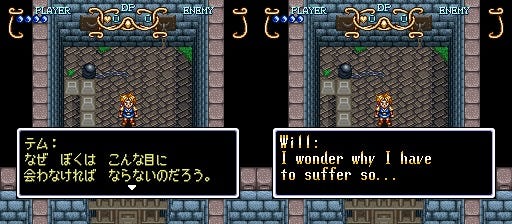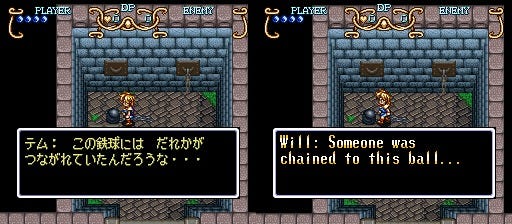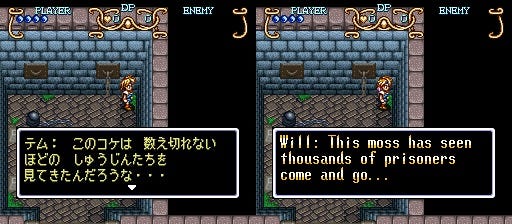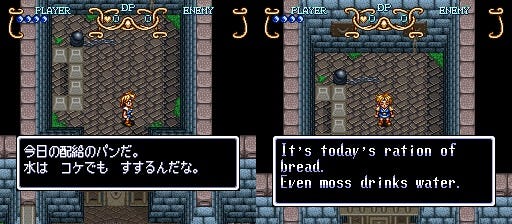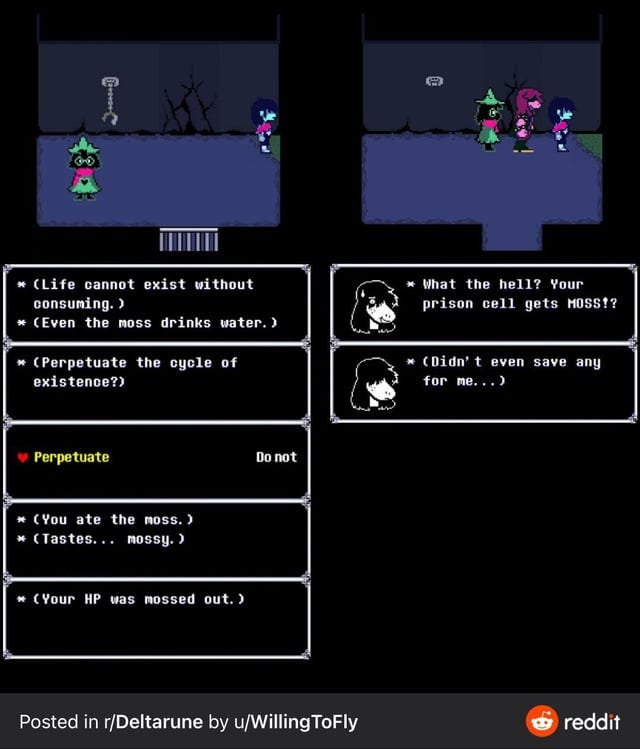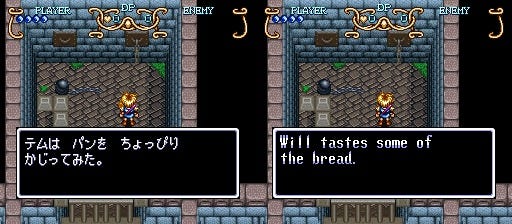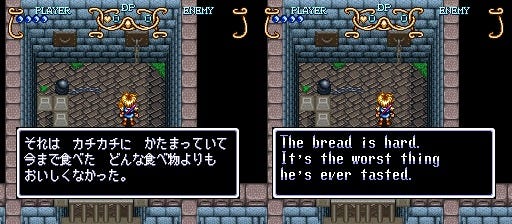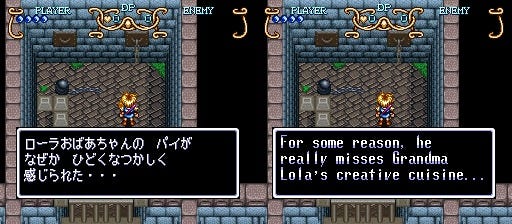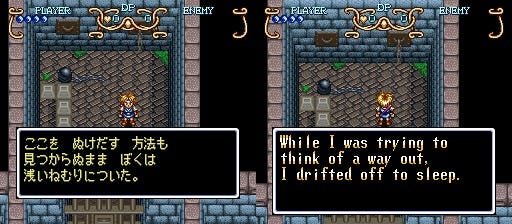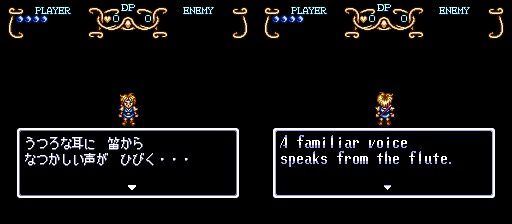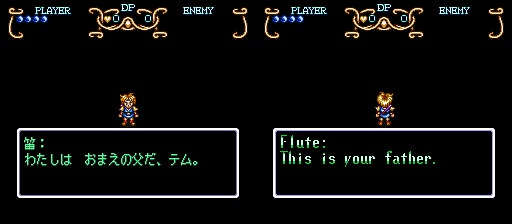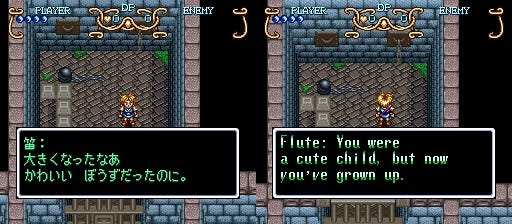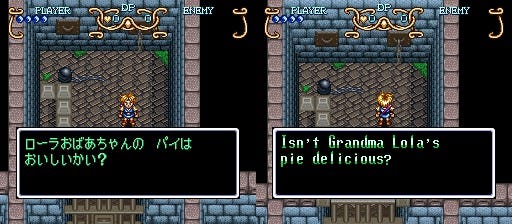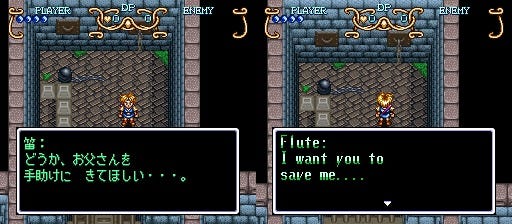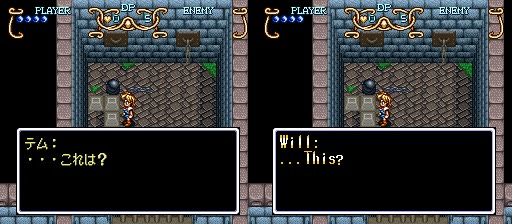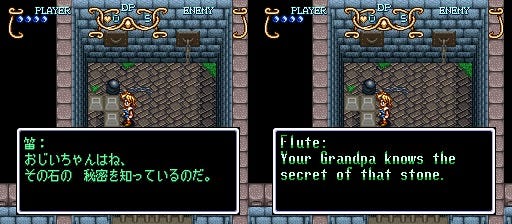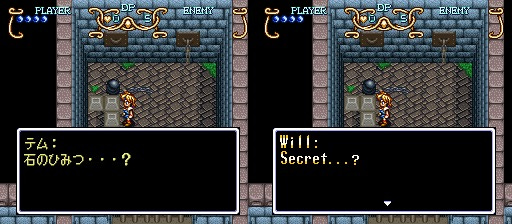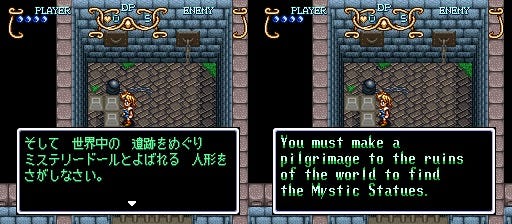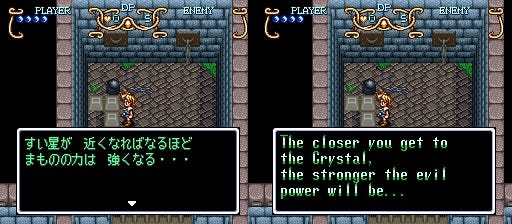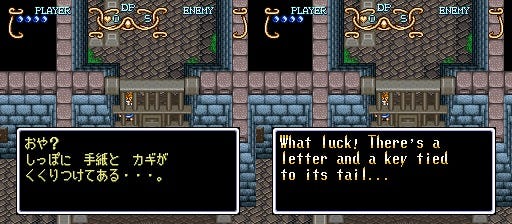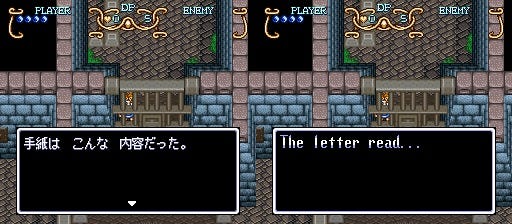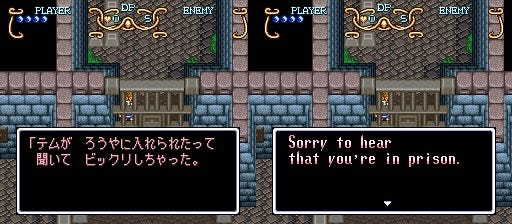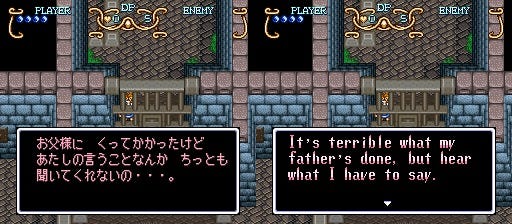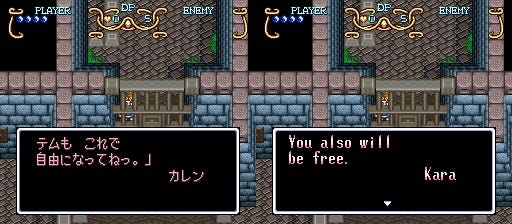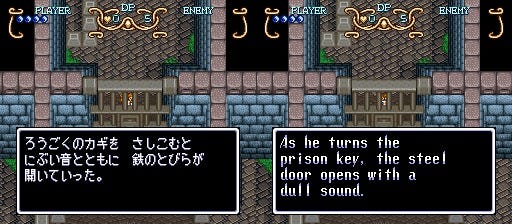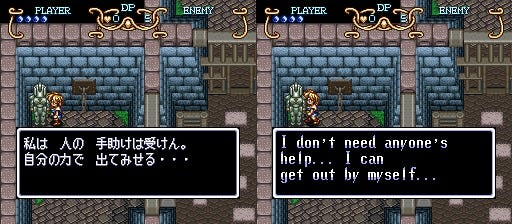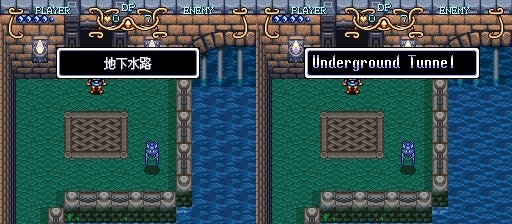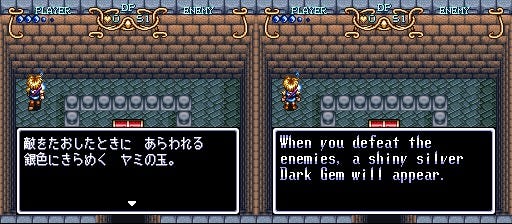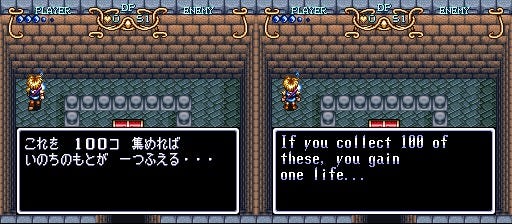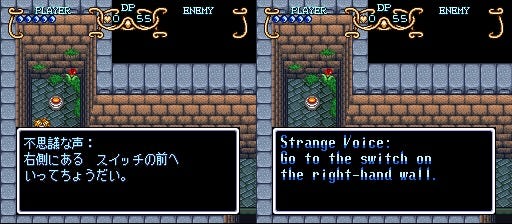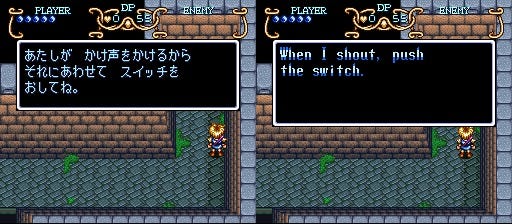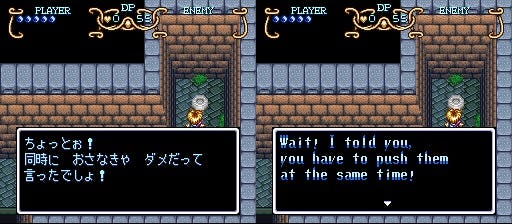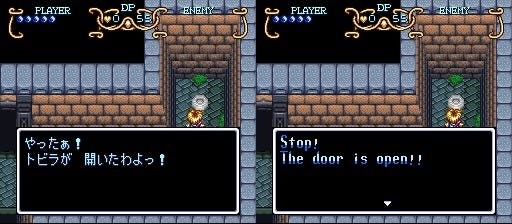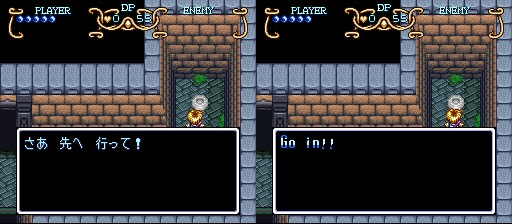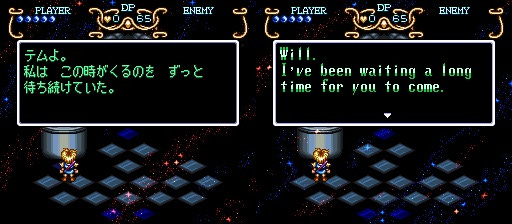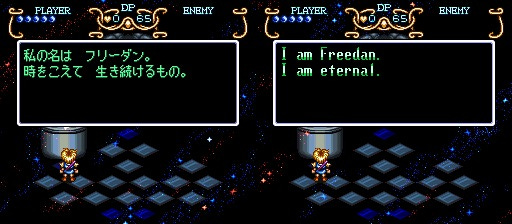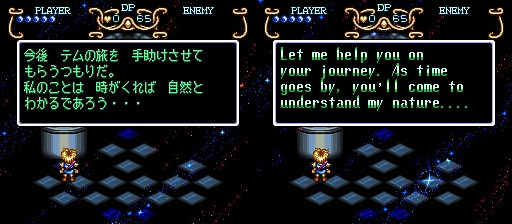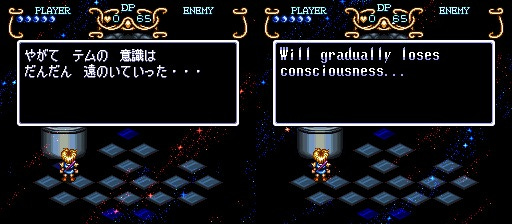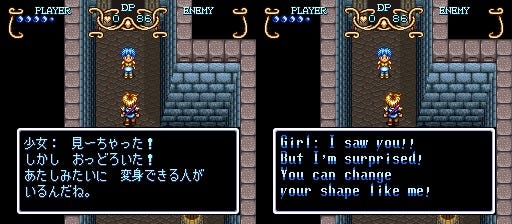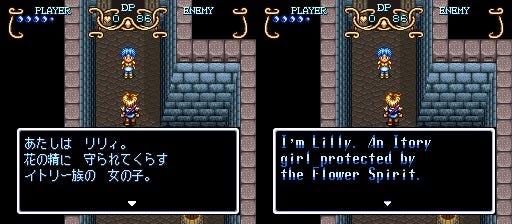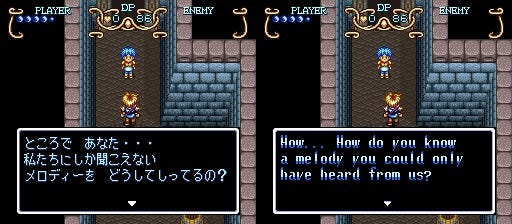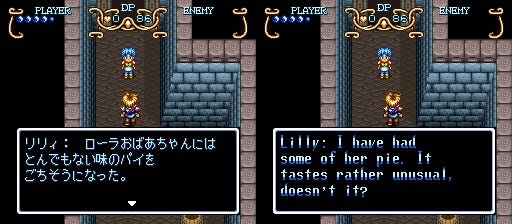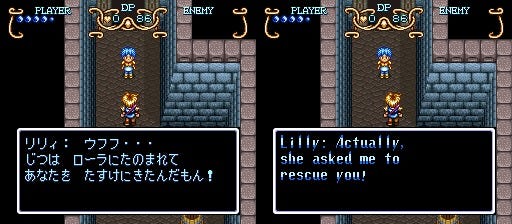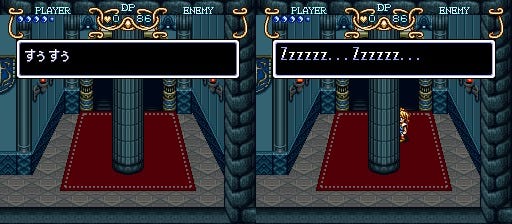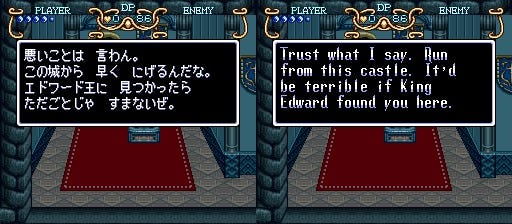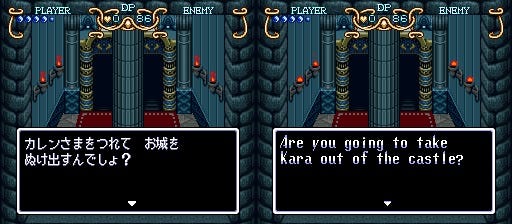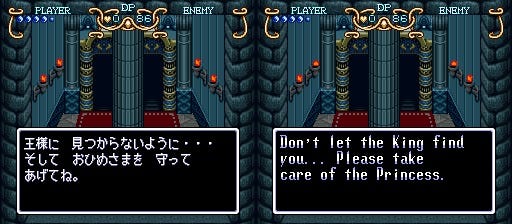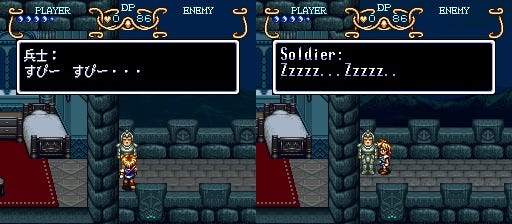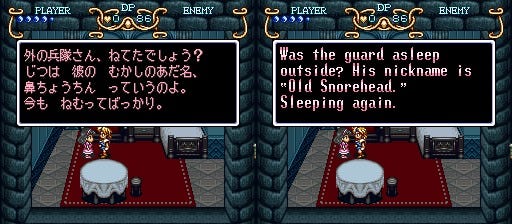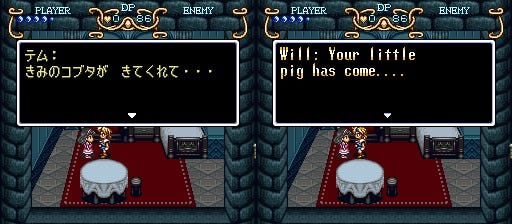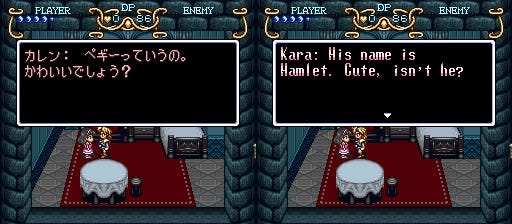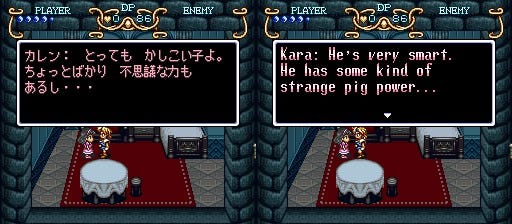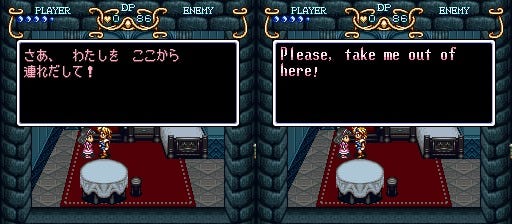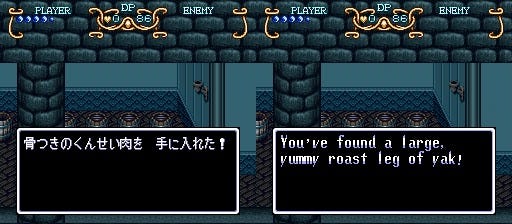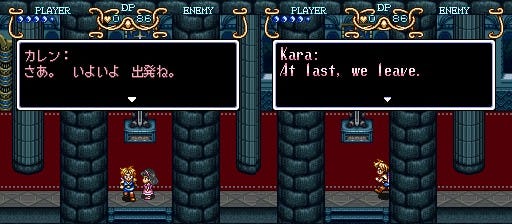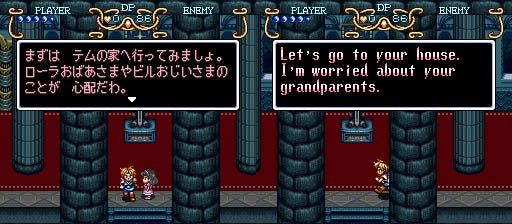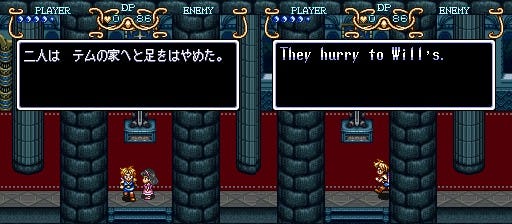Illusion of Gaia Translation Commentary Part 7: Underground Prison and Edward Castle Part 2
In which Karen is further mischaracterized
Standard disclaimers:
I’m an amateur. My advantage over the original translation is that I have no deadline pressure, and I have the modern internet to help me. I’m assuredly wrong about some of my translations.
Translation is hard. When I point out a mistranslation, it’s not a judgment of the original translator(s). With a few exceptions—this post contains one such.
Some of my translations are rather liberal. I’ll usually make note if so.
Please no jokes in the comments about Karen being a Karen. I really hate that trend.
Notation reminder:
JP: Original Japanese
T: My translation
OE: Original English
JP: エドワード城ろうや
T: Edward Castle Prison
OE: Edward’s Prison
I assume the OE couldn’t include the word castle for character limitations. In Japanese this whole word can be represented with one character: 城 (shiro)
Because more info can be fit in fewer characters on average, for many video games, the Japanese version will be marginally faster than the US version. Illusion of Gaia is a big exception.
More text is shown at once in Japanese—there are fewer text boxes. And bosses are much easier in the JP version. They’re pushovers. Despite these advantages, the JP version speedrun is about 20 minutes slower (iirc) just because of text scrolling. In the US version, most text appears instantly and can be mashed through very quickly. Occasionally dialogue boxes will scroll character by character, but there aren’t many of those. In the JP version, all dialogue boxes scroll that way.
So… 20 minutes of text scrolling in the speedrun, where you only see essential dialogue. I wonder how much of my time is spent just on text scrolling, to get all of these screenshots? Over an hour, probably? At least it’s only in one of the two versions.
JP: テム: なぜ ぼくは こんな目に 会わなければ ならないのだろう。
T: Tim: Why did this have to happen to me?
OE: Will: I wonder why I have to suffer so…
JP: そして ぼくは これから どうなってしまうのだろう。
とにかく ここから ぬけ出す 方法を 考えなくては...。
T + OE: I wonder what will become of me now.
Anyway, I have to think of a way to get out of here.
You can examine a few things in Tim’s cell. The iron ball:
JP: テム: この鉄球には だれかが つながれていたんだろうな...
T: Tim: I guess somebody was chained to this iron ball.
OE: Will: Someone was chained to this ball…
The door:
JP: テム: カギが かかっている...
T + OE: It’s locked.
And of course, the moss:
JP: テム: このコケは 数え切れない ほどの しゅうじんたちを 見てきたんだろうな...
彼らも このコケを 心のささえにして くらしていたのかもしれない...
T: Tim: I suppose this moss has seen countless prisoners come through.
I wonder if they got through it with emotional support from this moss.
OE: Will: This moss has seen thousands of prisoners come and go…
Those prisoners must have been encouraged by any sign of life….
My translation is overly literal. I like the OE.
You have to stand around a while before the story will progress. Eventually, there’s an event:
JP: 天井にあいた穴から 兵士の 低い声がひびく。
T: A soldier’s deep voice echoes from a hole in the ceiling.
OE: A soldier’s whisper comes from a hole in the ceiling.
It’s not clear whether the soldier has a deep voice, or if he’s whispering. 低い声 (hikui koe) means low voice and it can mean either low in pitch or low in volume. I think it’s more likely a deep voice than a whisper. A whisper would be hard to hear from a hole above.
JP: 今日の配給のパンだ。 水は コケでも すするんだな。
T: Here’s today’s bread ration. If you want water, go suck on the moss or something.
OE: It’s today’s ration of bread. Even moss drinks water.
I’ve long found this a memorable mistranslation. Such a bizarre thing to say.
What I’ll often find in translation is that the original is totally valid in some way. In another context, Even moss drinks water could make sense.
水は (mizu wa) means as for water. コケ (koke) is moss. でも (demo) has many meanings. One is even. It can also mean but, still, yet, or also. If you scroll through dictionaries, you’ll also find a use that’s …or something. すする (susuru) means to slurp or sip loudly. It is not specified whether it is Tim or the moss that is doing the slurping. んだ (nda) in most instances is explanatory, with a sense of because of [previous thing]. It can also be used as a command. Even moss drinks water is a valid translation of each of these words together. But it’s not what’s intended here. This should be some more natural variation of As for water, slurp moss or something.
I’m not the only person who found this line memorable. Toby Fox incorporated it into Deltarune Chapter 1.
I’m not sure how many people who played Deltarune understood the reference, but I was delighted. There’s a brief mention of this reference on page 264 of Legends of Localization Book 3: UNDERTALE, a great book about the difficulties encountered when translating Undertale into Japanese. It was nice to see an actually good translator confirm my interpretation of this line.
JP: テムは パンを ちょっぴり かじってみた。
T: Tim took the bread and nibbled a tiny bit.
OE: Will tastes some of the bread.
JP: それは カチカチに かたまっていて 今まで食べた どんな食べ物よりも おいしくなかった。
ローラおばあちゃんの パイが なぜか ひどくなつかしく 感じられた...
T: It was rock hard, and worse than any food he had ever tasted.
For some reason, he longed for grandma Laura’s pies.
OE: The bread is hard. It’s the worst thing he’s ever tasted.
For some reason, he really misses Grandma Lola’s creative cuisine…
This line hits way harder in the original JP, which has consistently made out Laura’s cooking to be unbearably bad. This bread is somehow even worse!
More time passes…
JP: 時が ゆっくりと 流れてゆき やがて 長い長い一日が終った。
じゅうじんの やり場のない 気持ちが 痛いほど わかってしまう...。
T: Time passed slowly. Eventually, the long, long day ended.
It’s become painfully clear, how it feels for a prisoner to have no emotional outlet.
OE: Time passes slowly, but the long day is ending.
It pains me to think of the prisoners’ feelings, not knowing what they should do….
Honestly not confident in my translation here. やり場 (yariba) means an outlet (for one’s anger, for example), and やり場のない 気持ち (yariba no nai kimochi) I believe means feeling of no outlet. Whatever it is exactly, Tim is being made aware of it 痛いほど (itai hodo) - to the degree that it’s painful.
JP: ここを ぬけだす 方法も 見つからぬまま ぼくは 浅いねむりについた。
T: Not having discovered a way to get out, I settled down into a light sleep.
OE: While I was trying to think of a way out, I drifted off to sleep.
JP: うつろな耳に 笛から なつかしい声が ひびく...
T: From the flute, a voice I longed to hear reverberated through my sleeping ears.
OE: A familiar voice speaks from the flute.
なつかしい (natsukashii) means beloved, fondly-remembered, missed, nostalgic. There’s nothing wrong with the OE’s word choice.
JP: 笛: テム...。
笛: わたしは おまえの父だ、テム。
テム: 父さん...?
T: Flute: Tim…
Flute: Tim, it’s your father.
Tim: Father?
OE: Flute: Will…
Flute: This is your father.
Will: Father…?
JP: 笛: 大きくなったなあ かわいい ぼうずだったのに。
ローラおばあちゃんの パイは おいしいかい?
T: Flute: Hey, you’ve gotten big, even though you were a cute little lad.
Aren’t grandma Laura’s pies delicious?
OE: Flute: You were a cute child, but now you’ve grown up.
Isn’t Grandma Lola’s pie delicious?
JP: テム: 父さん! どこにいるの?!
笛: 今は 言えない...
T: Tim: Father! Where are you?!
Flute: I can’t tell you now.
OE: Will: Uh, sure, Dad! Where are you?!
It’s invented, but I like the addition of uh, sure.
JP: おまえに 一つ たのみがある。 聞いてくれるか?
>はい、お父さんのたのみなら
>いやだ、ボクを見すてたくせに!
T: I have a favor to ask you. Can I ask you?
>Yes, what is this favor?
>No way, not after you abandoned me!
OE: I have something to ask of you. Listen…
>Yes, if it’s your wish!
>No! You deserted me!
The dialogue proceeds the same way no matter which option you choose.
JP: 笛: どうか、お父さんを 手助けに きてほしい...。
わたしも まえに このろうやに つながれていたことが あるのだ。 ほら 左がわのカベを 見なさい。
T: Flute: Please, I need you to come help.
I was once trapped in this jail too. Please take a look at the left wall.
OE: Flute: I want you to save me….
I, too, was once held in this cell. Look at the left-hand wall.
JP: テム: ...これは?
笛: ビルおじいちゃんから なにか 聞いてないかい?
T: Tim: What’s this?
Flute: Didn’t you hear something from grandpa Bill?
OE: Will: …This?
Flute: Have you heard anything from Grandpa Bill?
This is exactly what I was talking about previously with は (wa). これは (korewa) literally means as for this. JP speakers say this alllllll the time. But saying this? alone in English is uncommon. This is probably the last time I’ll mention this issue, but almost every time you see a JP→Eng script say this? on its own, it’s probably これは. Modern translation standards are to replace this with something more natural to English.
JP: テム: おじいちゃん? 建築家だったんでしょ?
T: Tim: Grandpa? You mean that he was an architect?
OE: Will: Grandpa? He was an architect…
JP: 笛: おじいちゃんはね、 その石の 秘密を知っているのだ。
テム: 石のひみつ...?
T: Flute: Your grandpa knows the secret of that stone.
Tim: The stone’s secret?
OE: Flute: Your Grandpa knows the secret of that stone.
Will: Secret…?
JP: おまえは これから 少しだけ こわい目にあうことに なるよ。
テム: こわいこと...?
T: Flute: After this, you’re going to encounter some situations that are a little scary.
Tim: Scary situations?
OE: Flute: Starting now, you will encounter a terrible thing.
Will: Do I have to…?
Here’s something else that’s common in Japanese scripts but sounds weird in English: repeating whatever the previous person just said in an inquisitory tone. The stone’s secret? Scary situations? Metal Gear? I’ve heard that it’s a way Japanese people show that they’re listening. I’ve left them translated literally just to show what’s going on. In a romhack I wouldn’t leave them like this, because in English it makes characters sound dumb.
How the OE translated this last one is so funny, though. You can just imagine Will whining. Awwwww, do I HAVE to encounter a terrible thing? I don’t wanna! The terrible thing translation comes from the word こと (koto) which often means thing or matter. But it can also mean circumstances or events. It can also act as a nominalizing suffix, which in this case means it would change scary into scariness. It’s a versatile word that you have to be careful with.
JP: 笛: 敵が 残した石を 拾いなさい。 そこには すい星のちからが ふくまれている。
そのちからは きっと おまえに 味方するだろう...
T: Flute: Pick up these stones that are left behind when enemies are defeated. The power of the comet is contained within.
I think that power will undoubtedly aid you.
OE: Flute: Pick up the stone your enemy left.
The power of the Crystal is contained there.
That power will prove to be your ally….
I’m not sure how comet became crystal. Comet is すい星 (suisei). The word for crystal that has been used in crystal ring is 水しょう (suishou). Something odd about these is that the game leaves 水 as kana when referring to the comet, but uses kanji for crystal. For the second half of the word, the game uses kanji for comet but kana for crystal. Both words can be represented entirely with kanji: 水星 and 水晶. If they were written like that in game, it would explain the mistranslation, but they’re not. Idunno how this happened.
Here’s a fun example of something I brought up in one of this blog’s first posts. Japanese can turn nouns into verbs by appending する (suru). Here it says 味方する (mikata suru) which would be like to do allyship or to ally you. Much as I love verbing words, it should be avoided in translation unless the meaning is super clear. OE handled it well.
JP: そして 世界中の 遺跡をめぐり ミステリードールとよばれる 人形を さがしなさい。
すい星が 近くなればなるほど まものの力は 強くなる...
T: Now, I want you to go on a pilgrimage to the world’s ancient ruins, to search out the statues called Mystery Dolls.
As the comet draws nearer, the power of monsters becomes stronger.
OE: You must make a pilgrimage to the ruins of the world to find the Mystic Statues.
The closer you get to the Crystal, the stronger the evil power will be…
The comet/crystal mistranslation makes the OE practically gibberish here. In the JP, it is unambiguously the comet that is getting closer, not Tim getting closer to the comet. But since they used the word crystal, and crystals don’t normally get close on their own volition, I assume that’s how the rest of the sentence got turned around.
I do like that they changed Mystery Doll to Mystic Statue though. Mystery Doll sounds silly to me. Still, I’m going to use the JP word in my translation. It is actually the English words Mystery Doll, by the way. ミステリードール (misuterii dooru). But it does also use the Japanese word for doll: 人形 (ningyou). I translated it as statue. I think doll in English tends to carry the connotation of a toy.
JP: テム... 時間がない.. 急ぐのだ... まずは インカの遺跡へ...
笛の声は だんだん 小さくなり やがて 聞こえなくなった。
T: Tim… There’s no time. You need to hurry. First, go to the Incan ruins.
The voice from the flute gradually faded until it could no longer be heard.
OE: Will… No time… Quickly… First to the Incan ruins…
The flute’s voice fades and disappears.
JP: ブヒ ブヒ
テム: このブタは たしか カレンの ペットだっけ...
T: Oink oink
Tim: I’m pretty sure this is Karen’s pet pig.
OE: Oink oink
Will: I wonder if this is Kara’s pig…
Ya think, Tim? Are there any other pigs around? Also, how did this pig get past all the monsters? Headcanon is that it came through one of the holes in the ceiling that guards toss bread through. Maybe it’s a very small pig.
JP: おや? しっぽに 手紙と カギが くくりつけてある...。
手紙は こんな 内容だった。
T: Oh? A letter and a key are tied onto its tail.
This is what the letter said.
OE: What luck! There’s a letter and a key tied to its tail…
The letter read…
JP: 「テムが ろうやに入れられたって 聞いて ビックリしちゃった。
お父様に くってかかったけど あたしの言うことなんか ちっとも 聞いてくれないの...。
T: Tim, I was so surprised to hear you were put in jail. I yelled at my dad to let you out, but no matter what I said, he didn’t listen at all.
OE: Sorry to hear that you’re in prison.
It’s terrible what my father’s done, but hear what I have to say.
An unfortunate translation erases Karen’s work. She’s been trying behind the scenes to rescue you. This time I think it’s a mistranslation, not an intentional change.
お父様に くってかかった (otousama ni kuttekakatta) means lashed out at father. The subject (Karen) is unspecified, so I wonder if the translator missed the に (ni - at/in/on/during) and took the king as the subject instead. Then they transformed what they thought was father lashed out as It’s terrible what my father’s done. After that it says ちっとも 聞いてくれない (chitto kiite kurenai - does not listen at all) and I imagine the translator didn’t know what to do with this given the previous mistranslation. So it became an exhortation for Will to hear Kara out, rather than a lament that her father would not hear her out.
JP: あたし もう こんなところに いるのは いやっ。 今夜 城をぬけ出すことにする。
テムも これで 自由になってねっ。」 カレン
T: I can’t stand to be in such a place any longer. Tonight, I’m going to escape from the castle.
With this, you will have your freedom as well. -Karen
OE: I too am a prisoner—in a prison of silk and gold.
But tonight I will leave the castle forever.
You also will be free. -Kara
On the other hand, this prison of silk and gold stuff is not a mistranslation. It’s made up, and I always thought it made her sound self-absorbed. A prison of silk and gold sounds like she’s saying her whole life is a metaphorical prison. But besides the fact that she doesn’t talk about being a prisoner at all in her letter, she is being treated as a prisoner literally. She’s confined to her room. It’s nicer than a cell, and I’m sure she gets better food to eat, but she still has no freedom—and not just in a metaphorical sense, like, “oh, being wealthy is so draining, nobody speaks to the real you!”
This letter isn’t as bad as the what do I care if you lose your head stuff, but a mistranslation + stuff invented whole cloth leads to another mischaracterization of Karen.
JP: ろうごくのカギを 手に入れた!
ろうごくのカギを さしこむと にぶい音とともに 鉄のとびらが 開いていった。
T: Got a prison key!
When he inserted the prison key, the iron door opened with a muffled sound.
OE: You have the key!
As he turns the prison key, the steel door opens with a dull sound.
You can also use the key to let someone out of the neighboring cell:
JP: 私は 人の 手助けは受けん。 自分の力で 出てみせる...
T: I don’t need anyone’s help. I’ll get out of here on my own.
OE: I don’t need anyone’s help… I can get out by myself…
The person in the neighboring cell, it turns out, is very dumb. There’s also a save point nearby, and Gaia has some new text.
JP: 私は 生命のみなもと ガイア。 そなたに ひとつ 助言を あたえようと思う。
一定地域の敵を すべてたおすと 能力の上がる 宝石があらわれる。 そなたは それで 強くなってゆく。
T: I am the source of life, Gaia. I’ll give you some advice.
In certain areas, when you defeat all enemies in a room, a jewel that increases your abilities will appear. It will make you stronger.
OE: I am Gaia, the source of all life. I’ll give you some advice.
When you defeat all the enemies in an area, you will get a jewel that increases your abilities.
JP: 敵の場所は スタートボタンをおせば わかるはず。 まものは さがしだしてでも 残さず たおしてゆくことだ...
T: If you press the Start Button, you will see the location of enemies. Use it to track down and defeat all monsters, without leaving any behind.
OE: Push the Start Button to see the locations of your enemies.
Find the demons and defeat them.
JP: HP(体力)が 上がった!
テム: そうか... 自分のいる地域の敵を 全部たおすと この宝石が あらわれるんだな...
T: HP (endurance) has increased!
Tim: I see. When I defeat all the monsters in the area, this jewel appears.
OE: Your HP (Power) has increased!
Will: When you defeat all of the enemies around you, a Jewel will appear.
JP: 地下水路
T: Underground waterway
OE: Underground Tunnel
JP: STR(力の強い)が 上がった!
T: STR (Strength) has increased!
OE: Your STR (Strength) has increased!
Pretty soon we’ll run into a little dandelion seed flying around. It gets mad at you if you hit it.
JP: いたいっ! 何するのよっ!!
T: Ouch! What are you doing!?
OE: Hey! What are you doing!!
JP: 早く こっちに 来なさいよっ! まものに やられちゃうじゃないっ!
T: Hurry, this way! Or monsters will get you!
OE: Come here, or the demon will get you!
Japanese not specifying plural strikes again. As a kid, this line made me think that there was supposed to be one big demon on my tail. She’s talking about all of the monsters in the area.
じゃない (janai) is usually used for negation: is not. But here it’s used to similar effect as ね (ne), seeking the listener’s agreement. じゃない at sentence end, without か (ka) or ですか (desuka), is associated with feminine speech, so JP players get the hint that the dandelion seed is a girl. It’s not worth trying to awkwardly shoehorn that into English, so we lose that nuance.
JP: DEF(守りの強さ)が上がった!
T: DEF (Defense) has increased!
OE: Your DEF (Defense) has increased!
Heh. Forgot to grab a screenshot of DEF Up in English. Thankfully there was another one later in the dungeon.
I’ll be skipping contents of treasure chests unless they’re unique. This area only has an herb and red jewels.
JP: かたくて おしこめないっ! さびついているようだな...
T: It’s so hard, it can’t be pushed! It seems like it’s rusted over.
OE: It won’t go in! Maybe it’s rusty…
A spirit inside a hidden room gives some advice. Tim is utterly unperturbed to be talking to a spirit.
JP: 敵 をたおしたときに あらわれる 銀色にきらめく ヤミの玉。
これを 100コ 集めれば いのちのもとが 一つふえる...
T: When you defeat an enemy, a twinkling ball of darkness appears.
If you gather 100 of them, you get an extra life.
OE: When you defeat the enemies, a shiny silver Dark Gem will appear.
If you collect 100 of these, you gain one life…
JP: たとえ 敵にやられても 達くはなれた場所まで もどることは なくなるのだ...
T: Even if you are defeated by an enemy, you will not have to return to a far away place.
OE: Even if you’re defeated, you won’t have to go back very far…
A small flower exhorts you to play your flute. Tim is utterly unperturbed to be talking to a flower.
JP: 片すみにさく花: 笛を ふいてごらん... あのメロディを ふいてごらん...
T: Blooming flower in the corner: Play your flute. Play that melody.
OE: Flower in the corner: Try playing the Flute… Play the melody…
JP: ローラから 教わった メロディーを 静かにふきはじめた。
すると どこからともなく 声が 聞こえてきた...
T: Tim began to play the melody he learned from Laura.
After finishing, out of nowhere, a voice could be heard.
OE: He softly played the melody he had learned from Lola.
He heard a soft voice from somewhere…
JP: 不思議な声: 右側にある スイッチの前へ いってちょうだい。
T: Mysterious voice: Go to the switch on the right side.
OE: Strange Voice: Go to the switch on the right-hand wall.
JP: 不思議な声: このスイッチはね 2つ 同時に おさないと トビラが開かないの。
あたしが かけ声をかけるから それにあわせて スイッチを おしてね。
T: Mysterious voice: The gate won’t open unless these switches are pressed at the same time.
When I shout, I want you to push that switch.
OE: Strange Voice: The door won’t open unless you push this switch on the count of three.
When I shout, push the switch.
JP: 1 2 3の タイミングだからね。 まちがえないでね。
T: I’ll count 1, 2, 3. Don’t mess up.
OE: I’ll count 1, 2, 3. Don’t make a mistake.
I’m trying to capture all dialogue, so you know what we have to do right away.
JP: ちょっとぉ! 同時に おさなきゃ ダメだって 言ったでしょ!
T: Hey! I said that if we don’t push it at the same time, then it won’t work. Got it?
OE: Wait! I told you, you have to push them at the same time!
She then repeats the previous instructions. Let’s do it right this time.
JP: やったぁ! トビラが 開いたわよっ!
さあ 先へ 行って!
T: Woohoo! The gate opened!
Hurry on ahead!
OE: Stop! The door is open!!
Go in!!
Did the translator mistake やった (yatta - yay) for やめって (yamette - stop)?
The next dialogue comes from a Dark Place, where there’s a statue of a warrior on the left side. First, Gaia will give us some advice again:
JP: そなたの姿は かりの姿。となりに たたずむ 石像の前に 立ってみるがいい。
T: Your form is only temporary. Stand in front of the statue next to you.
OE: Your shape is only temporary. Try standing in front of the statue next to you.
JP: テムの頭の中で、声がこだまする。
T: A voice echoes in Tim’s head.
OE: Will hears a voice in his head.
JP: テムよ。 私は この時がくるのを ずっと 待ち続けていた。
私の名は フリーダン。 時をこえて 生き続けるもの。
T: Tim. I have long been waiting for this time to come.
My name is Freedan. I exist beyond the reaches of time.
OE: Will. I’ve been waiting a long time for you to come.
I am Freedan. I am eternal.
His name could also be spelled Friedan. Maybe it should, since that’s an actual name. But I don’t think he has much in common with Betty Friedan.
JP: 今後 テムの旅を 手助けさせて もらうつもりだ。 私のことは 時がくれば 自然と わかるであろう...
T: Hereafter, I will offer my help on your journey. You will understand my nature, when the time comes.
OE: Let me help you on your journey. As time goes by, you’ll come to understand my nature….
JP: やがて テムの 意識は だんだん 遠のいていった...
T: Before long, Tim’s consciousness gradually receded.
OE: Will gradually loses consciousness…
With Freedan we make short work of the rest of the dungeon. When we leave…
JP: 敵の気配が消え テムの変身が 解けてゆく...
T: With no more sign of any enemies, Tim’s transformation reverts.
OE: When the enemies are destroyed, Will can return to his original shape…
JP: 少女: 見ーちゃった! しかし おっどろいた! あたしみたいに 変身できる人が いるんだね。
T: Young woman: Saaaaw youuuu! But I’m surprised! You’re a shapeshifter like me, huh?
OE: Girl: I saw you!! But I’m surprised! You can change your shape like me!
We’re finally introduced to Lily. Properly, not when she’s not a dandelion seed.
JP: あたしは リリィ。 花の精に 守られてくらす イトリー族の 女の子。
ところで あなた... 私たちにしか聞こえない メロディーを どうしてしってるの?
T: I’m Lily. I’m a girl from the Itory tribe, which is protected by flower spirits.
By the way, how do you know a melody you could only have heard from us?
OE: I’m Lilly. An Itory girl protected by the Flower Spirit.
How… How do you know a melody you could only have heard from us?
It’s definitely the tribe, not Lily specifically, who is protected by flower spirits. Not clear whether there’s one or many flower spirits, but I imagine more than one.
JP: ローラおばあちゃんから 教わったんだよ。 本当に困ったときに ふけって。
T: Tim: I learned it from grandma Laura. She told me to play it when I’m in a bind.
OE: Will: I learned it from Grandma Lola. She hummed it whenever she was upset.
Ohhhh, this one is tricky! The first sentence is easy. As for the second, 本当に (hontouni) means really or truly. 困った (komatta) is unmanageable, hopeless, inconvenient, disturbing - a host of negative adjectives. ときに (toki ni) here means during a time. So far we have during a truly difficult time. Then we have ふけって (fukette) being a wily little bugger.
Japanese verbs have a dictionary form which always ends in an u sound. u, ru, ku, etc. They can be inflected into a te form, which will incorporate て (te) or で (de). At first glance, you’d guess that ふけって is the te form of a verb, most likely ふける (fukeru). ふける has a ton of definitions. To age, to advance, to run away, to become ready to eat after steaming, to be engrossed in, to indulge in. Of all of these, only one has a te form of ふけって, and that’s to indulge in / to be engrossed/lost in. So the translator thought it was saying that Laura was lost in thought during troubled times, and turned that into humming because how else could Tim have heard it?
But that makes no sense. Laura taught us this melody just a little while ago! Tim didn’t pick it up from her humming randomly.
In this case ふけって is not a te form at all. If you want to say that someone says or said X, you can say [X] という (to iu). But JP speakers like to shorten this down to just って (tte). And if this isn’t a te form of a verb, it must be an inflected form of a shorter verb, ふく (fuku). From context, you can figure out that it’s 吹く which means to play a wind instrument or to whistle. So the final ふけって really means said to play.
Kanji are a pain for JSL speakers to learn, but they can save some headaches. If this had said 吹けって instead of ふけって, it would have been obvious.
JP: リリィ: ローラおばあちゃんには とんでもない味のパイを ごちそうになった。
T: Lily: Grandma Laura “treated” me to one of her terrible tasting pies.
OE: Lilly: I have had some of her pie. It tastes rather unusual, doesn’t it?
Here’s a prime example of how Karen speaks more respectfully than Lily. To Karen, Tim’s grandmother is ローラおばあ様 (Laura obaasama), about as respectful as can be. To Lily, she’s ローラおばあちゃん (Laura obaachan) which is the same thing Tim calls her. Pretty dang familiar for someone she just met! I think it’s kinda rude, but not rude enough for anyone to call her out on it.
JP: テム: おばあちゃんを 知ってるの!?
リリィ: ウフフ... じつは ローラにたのまれて あなたを たすけにきたんだもん!
T: Tim: You know my grandma?
Lily: Heehee. Actually, she asked me to come help you!
OE: Will: You know my grandmother?!
Lilly: Actually, she asked me to rescue you!
JP: リリィ: あっ。 長老さまが呼んでる... あたし 行かなくちゃ。
リリィ: あとで きっとまた 会えるわ。 じゃあネ、テム!
T: Lily: Ahh. That was the Elder calling just now. I have to go.
Lily: I’m sure we’ll meet again soon. See you then, Tim!
OE: Lilly: The Elder is calling… I have to go.
Lilly: We’ll meet again! Goodbye, Will!
We can finally leave the dungeon. At night, almost every NPC in the castle has different dialogue. The only ones who don’t are the shy soldier and the woman he’s confessing his feelings for.
JP: すぅすぅ
OE: Zzzzzz… Zzzzzz…
There’s no better way to translate this, but I wouldn’t add ellipses for no reason.
JP: うつら うつら...
OE: Zzzzzz… Zzzzzz…
Multiple soldiers asleep at their posts. Tsk tsk.
If you try to leave, Tim says this:
JP: テム: (いや カレンを 連れ出すなら 今のうちだな...)
T: Tim: (No, I need to get Karen out of here right away.)
OE: Will: (If you want to take her away, now’s the time…)
Here’s the soldier on the far left:
JP: あっ。 お前はっ!
よく あの ろうやから ぬけ出せたものだな...。
T: Ah! It’s you!
I’m glad you escaped from the prison.
OE: Ah! It’s you!
You’ve escaped from the prison…
JP: 悪いことは 言わん。 この城から 早く にげるんだな。 エドワード王に 見つかったら ただごとじゃ すまないぜ。
T: Take my advice. Run away from this castle, quickly. You’ll be sorry if you’re caught by King Edward.
OE: Trust what I say. Run from this castle. It’d be terrible if King Edward found you here.
I love this expression: 悪いことは 言わん (warui koto wa iwan). It equates to take my advice, but literally means I don’t say a bad thing.
The maid on the second floor of the right tower:
JP: カレンさまをつれて お城を ぬけ出すんでしょ?
王様に 見つからないように... そして おひあさまを 守って あげてね。
T: Are you taking Princess Karen and sneaking out of the castle?
Take care not to let the king find you. And be sure to protect the princess, ok?
OE: Are you going to take Kara out of the castle?
Don’t let the King find you.. Please take care of the Princess.
JP: 兵士: すぴー すぴー...
OE: Soldier: Zzzzz…Zzzzz..
JP: カレン: やっぱり きてくれたのね! どうもありがとう。
T: Karen: I knew you’d come for me! Thank you so much.
OE: Of course, you’ve come! Thank you.
JP: 外の兵隊さん、ねてたでしょう? じつは 彼の むかしのあだ名、 鼻ちょうちん っていうのよ。 今も ねむってばっかり。
T: I’m guessing the soldier outside was asleep? Actually, his nickname used to be “Snot Bubble”. Even now, he’s sleeping.
OE: Was the guard asleep outside? His nickname is “Old Snorehead.” Sleeping again.
鼻ちょうちん (hanachouchin): Snot bubble. Let it never be said that this blog is not educational.
JP: テム: きみのコブタが きてくれて...
T: Tim: Your piglet came to help me.
OE: Will: Your little pig has come.
A minor note is that the JP is not in past tense. It’s in te form. That’s why OE isn’t past. Why would I choose past tense, then? 1) That’s how you’d say it in English. 2) Japanese takes the tense of the final verb in the sentence, and Tim trails off at the end with a verb ending in te, both implying an unfinished thought. If he had finished the thought, it would probably have been past tense. But there’s no way to know for sure.
JP: カレン: ペギーっていうの。 かわいいでしょう?
T: Karen: Its name is Piggy. Isn’t it cute?
OE: Kara: His name is Hamlet. Cute, isn’t he?
Piggy’s sex is not specified. OE chose to make it a boy. Also to rename it, which is no surprise. Its name is the English word piggy. ペギー (pegii). It would sound like an ok name in Japanese because it’s from a different language. In English it’s the least creative name ever.
JP: カレン: とっても かしこい子よ。 ちょっとばかり 不思議な力も あるし...
さあ、 わたしを ここから 連れだして!
T: Karen: It’s a very clever animal. It even has a somewhat mysterious power.
Come now, let’s get out of here!
OE: Kara: He’s very smart. He has some kind of strange pig power…
Please, take me out of here!
It definitely does not say pig power in JP, but I don’t mind at all. Three cheers for pig power!
When you try to leave, Karen hits you with:
JP: カレン: あ そうだっ! 長旅に なるかもしれないし 食べ物を 持っていきましょ。
地下室へ いってくれない?
T: Karen: Oh, that’s right! Since this might be a long trip, we should go get some food.
Will you please go to the basement?
OE: Karen: Oh, wait! It will be a long trip, we should take food!
Would you go to the cellar with me?
Whoops! They left her name as Karen in English instead of Kara. I’d guess most players didn’t notice.
JP: 骨つきのくんせい肉を 手に入れた!
カレン:これで 準備 オッケー! さあ 兵隊さんに 見つからない うちに いきましょ!
T: Got smoked meat on a bone!
Karen: With this, we’re ready! Now then, let’s go before we’re caught by a soldier!
OE: You’ve found a large, yummy roast leg of yak!
Kara: Everything’s ready! Let’s go before the soldiers find us!
I wonder why they chose yak for the OE? Because it’s a short word and helps with the character limitations?
JP: カレン: さあ。 いよいよ 出発ね。
まずは テムの家へ行ってみましょ。 ローラおばあさまやビルおじいさまの ことが 心配だわ。
T: Karen: All right. Finally getting out of here, huh?
First of all, let’s go to your house. I’m worried about Miss Laura and Mr. Bill.
OE: Kara: At last, we leave.
Let’s go to your house. I’m worried about your grandparents.
Not that it’s a mistranslation, but Karen once again strikes me as a thoughtful person. Her first priority is Tim’s grandparents! This is not someone who would say what do I care if you lose your head?, damn it! (Will I ever stop harping on this? Time will tell!)
JP: 二人は テムの家へと足をはやめた。
T: The two hurried to Tim’s house.
OE: They hurry to Will’s.
Goodbye, Edward Castle! That was a long post, but I wanted to get the castle out of the way. Next, we return to South Cape, then move on to Itory Village.





